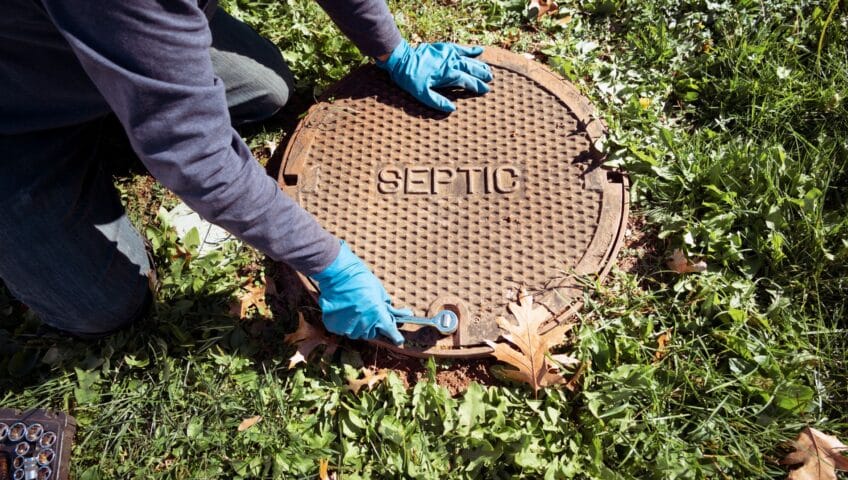Understanding the basics of septic systems is essential for any property owner, particularly those located in rural areas or lacking access to centralised sewage systems. A well-maintained septic system is crucial for effectively treating wastewater, safeguarding the local environment, and ensuring the health of your property. This article will provide a comprehensive overview of the fundamentals of septic systems, exploring their components, function, and necessary maintenance practices.
As a leader in eco-construction and landscaping services, we at New Wave Earth Works are committed to sharing knowledge and providing guidance on sustainable property management practices, including proper septic system care. This Septic Systems 101 guide equips property owners with essential information that will promote informed decision-making and responsible stewardship of their septic systems. Read on for an in-depth understanding of the key aspects to consider before, during, and after the installation of a septic system.
1. Components of a Septic System
A basic septic system is composed of two primary components: a septic tank and a soil absorption system, often referred to as a drain field or leach field. Understanding the function of each component is essential for proper maintenance and troubleshooting.
– Septic tank: The septic tank is an underground, watertight container usually made of concrete, fibreglass, or plastic. Its purpose is to store and break down wastewater from your home, separating solid waste (sludge) from liquid waste (effluent). The tank allows heavier solids to settle at the bottom while lighter materials, such as oils and fats, rise to the top to form a layer known as scum.
– Soil absorption system: The soil absorption system is responsible for dispersing the liquid effluent from the septic tank into the surrounding soil. This component typically consists of perforated pipes laid in gravel-filled trenches or beds, allowing the effluent to filter through the soil, where natural processes further treat and neutralise contaminants before reaching groundwater.
2. Installing a Septic System: Factors to Consider
Property owners in Pitt Meadows considering installing a septic system should take several factors into account:
– Soil evaluation: Conducting a thorough soil evaluation is crucial, as the soil type, depth, and underlying water table can significantly impact your septic system’s functionality and the environment surrounding your property. A professional soil test, known as a perc test, is typically required to determine the soil’s absorptive capacity.
– Site planning: Proper land grading and ensuring safe distances from wells, streams, and property lines are important factors to consider when planning your septic system installation. Local regulations and guidelines will provide specific requirements and restrictions on the placement of your septic components.
– Professional consultation and design: Due to the complexity of septic systems and their potential impact on property value, it is highly recommended to engage a qualified professional in civil construction to assess your needs, design the system, and oversee the installation. This ensures adherence to local regulations and long-term system efficiency.
3. Septic System Maintenance for Optimal Functioning
Performing regular septic system maintenance can extend the system’s lifespan and decrease the likelihood of costly repairs or environmental issues. Here are some essential maintenance tips for property owners in Pitt Meadows:
– Regular inspections: Plan to have your septic system inspected by a qualified professional at least once every three years to check for leaks, assess the scum and sludge layers, and ensure proper functioning of mechanical components.
– Pumping the septic tank: The frequency of septic tank pumping depends on factors such as tank size, household water usage, and the number of occupants. Generally, septic tanks require pumping every 3 to 5 years. Regular pumping prevents the build-up of solids, which can result in system failure or sewage backup.
– Monitoring water usage: Reducing water usage through efficient fixtures and appliances can significantly reduce the strain on your septic system. Consider fixing leaks promptly and avoiding simultaneous high water usage activities, such as running the dishwasher and washing machine simultaneously.
– Proper waste disposal: Be cautious about what is flushed down the toilet or washed down the drain, as some items can disrupt the septic tank’s bacteria balance or cause blockages in the pipes. Avoid disposing of items like grease, coffee grounds, flushable wipes, and chemicals like paints or solvents.
4. Troubleshooting Common Septic System Problems
Property owners should be aware of common septic system problems and signs of dysfunction:
– Unpleasant odours: If you notice foul smells near the septic tank or leach field, it may indicate a blockage or a full septic tank requiring pumping.
– Effluent surfacing: Wet spots or ponding water near your drain field can suggest drainage problems resulting from a full tank, blocked pipes, or an overloaded system.
– Slow drains and sewage backups: If drains in your household empty slowly or you experience sewage backup in your toilets or sinks, it could signify a full septic tank, clogged pipes, or a malfunctioning septic system.
In case of any irregularities, consider contacting a professional in civil construction and septic system maintenance, such as New Wave Earth Works, for expert diagnosis and assistance.
5. Local Regulations and Environmental Considerations
In Pitt Meadows, various local and regional regulations govern septic system installation and maintenance. Familiarising yourself with these regulations, as well as understanding proper septic care’s importance for protecting the environment, is crucial. Regular septic system maintenance helps prevent groundwater contamination, safeguarding public health and local ecosystems, including precious water resources like the Pitt River and surrounding wetlands.
Your Partner in Septic System Excellence
As a property owner in Pitt Meadows, understanding the basics of septic systems is crucial for ensuring the proper care and maintenance of this vital aspect of your property. New Wave Earth Works, a leading eco-construction and landscaping services provider, is committed to assisting you in successfully navigating this complex subject.
By partnering with New Wave Earth Works, you can benefit from expert civil construction and dedication to protecting the environment and your property. Our professional team will guide you through every step of your septic system journey, from initial planning and installation to regular inspections and essential maintenance services. Contact New Wave Earth Works today to discuss how we can help you ensure the optimal functioning of your septic system and contribute to a greener and healthier community in Pitt Meadows.


